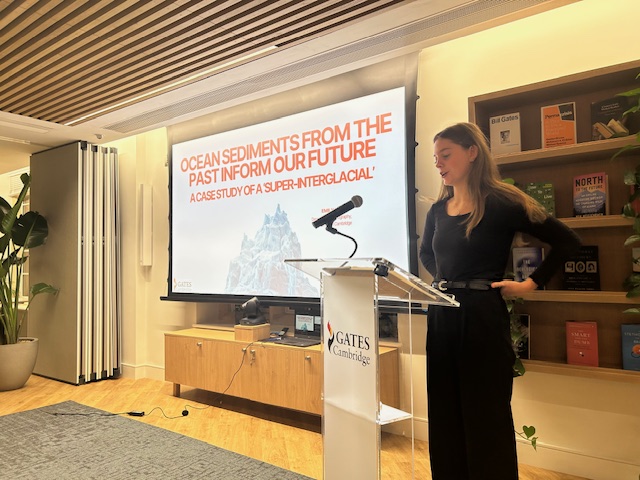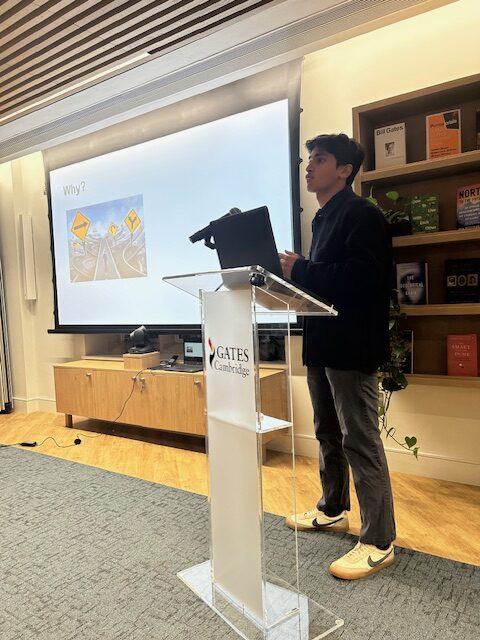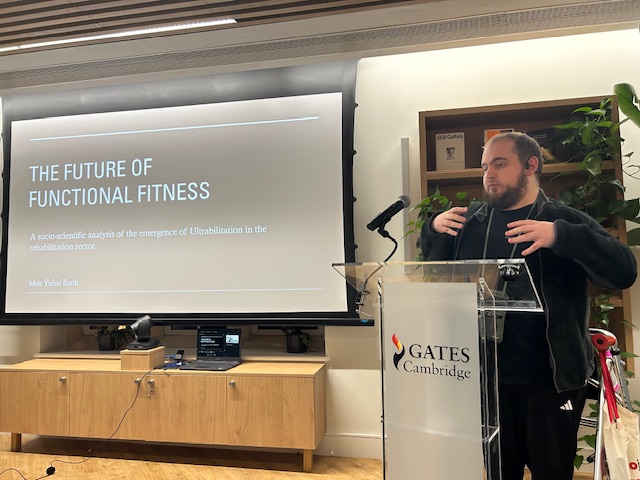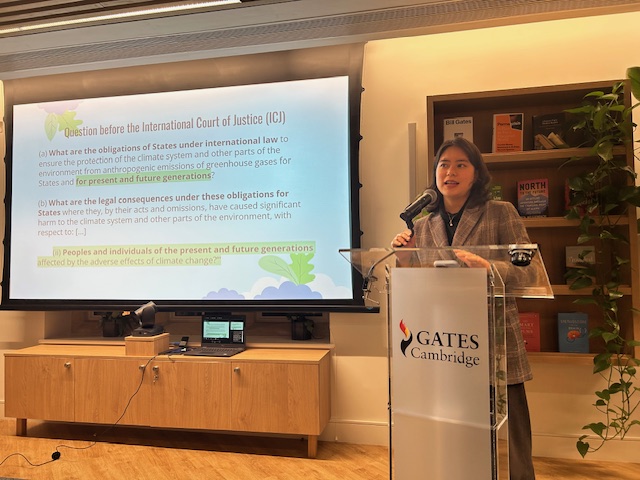
The Gates Cambridge internal symposium saw five Scholars showcase their research on everything from space food to future climate change protections
Five Gates Cambridge Scholars gave stimulating talks at the end of last week on topics ranging from space nutrition and paleooceanography to intelligence, ultrahabilitation and whether international courts can sue states based on potential climate change harm to future generations.
The Gates Cambridge internal symposium is a popular feature on the Scholars Council calendar, enabling scholars to share their research with their peers. Organised and introduced by internal officer Avweroswo Akpojaro [2024], the theme of the talks was the future of humanity.
Annie Shelton kicked off the event. Annie [2025] is doing a PhD in Plant Sciences and has worked on the Crop Production Team at NASA Kennedy Space Centre as both an intern and a contracted scientist. She spoke about all the issues that relate to eating in space – including growing plants in space, maintaining a balanced diet and the challenges of eating in zero gravity and ensuring food remains edible on long space flights [the flight to Mars is likely to take eight months].
 Annie [pictured right] traced the history of space food from astronaut John Glenn’s pre-packaged diet to current experiments with pick and eat food. Annie spoke about her participation in the Deep Space Food programme, a competition to develop novel food technologies that will work in space. Now working with the Deep Space Food Consortium, she said: “The whole space food system is complex and needs to reflect different settings, from space stations to base camps. And everything needs to work together.” She added that growing food in space has a psychological as well as a physical impact. “It reminds people of home. Food is really important for social wellbeing.”
Annie [pictured right] traced the history of space food from astronaut John Glenn’s pre-packaged diet to current experiments with pick and eat food. Annie spoke about her participation in the Deep Space Food programme, a competition to develop novel food technologies that will work in space. Now working with the Deep Space Food Consortium, she said: “The whole space food system is complex and needs to reflect different settings, from space stations to base camps. And everything needs to work together.” She added that growing food in space has a psychological as well as a physical impact. “It reminds people of home. Food is really important for social wellbeing.”
 Emily Kraus [2024, pictured left] studies paleooceanography and is continuing her MPhil work as a research assistant in the Department of Geography. She spoke about research on sediment cores from the MIS 11 period around 400,000 years ago when sea levels are thought to have risen significantly due to glacial melting. By examining the sediment cores of ancient plankton, it was determined that the length of this period of melting was more important than the peak temperature. The research will help scientists make better predictions for the future about the impact of climate change.
Emily Kraus [2024, pictured left] studies paleooceanography and is continuing her MPhil work as a research assistant in the Department of Geography. She spoke about research on sediment cores from the MIS 11 period around 400,000 years ago when sea levels are thought to have risen significantly due to glacial melting. By examining the sediment cores of ancient plankton, it was determined that the length of this period of melting was more important than the peak temperature. The research will help scientists make better predictions for the future about the impact of climate change.
 Ishan Kalburge [2024, pictured right], who is doing a PhD in Engineering, compared human and artificial intelligence models. He said humans are able to generalise due to both conscious and unconscious intelligence and to bring together working memory, sensations, perceptions and interpretations based on probability. That probabilistic intelligence means they can extract relevant information and learn from the world around them. He says the research helps us “to better understand why LLM models fail to be smart”.
Ishan Kalburge [2024, pictured right], who is doing a PhD in Engineering, compared human and artificial intelligence models. He said humans are able to generalise due to both conscious and unconscious intelligence and to bring together working memory, sensations, perceptions and interpretations based on probability. That probabilistic intelligence means they can extract relevant information and learn from the world around them. He says the research helps us “to better understand why LLM models fail to be smart”.
Meir Barth [2020], who is doing a PhD in Sociology, spoke about the future of functional fitness. He questioned what ability or capability is and how we measure and change it. He said the coming wave of AI will disrupt what it means to live and cannot be stopped. “The question then becomes how do we not fight it, but harness it, how do we ride the wave?” he stated.
 Meir [pictured left] has experienced how tech innovations can make a difference to people’s lives, having benefited from cutting-edge biotechnology to reconstruct a joint that had disintegrated, enabling him to walk. He said this ability to expand the scope of human potential could cause tensions in relation to the disability justice movement and widen inequality. He is keen to explore how technology can be used in a way that balances these tensions ethically.
Meir [pictured left] has experienced how tech innovations can make a difference to people’s lives, having benefited from cutting-edge biotechnology to reconstruct a joint that had disintegrated, enabling him to walk. He said this ability to expand the scope of human potential could cause tensions in relation to the disability justice movement and widen inequality. He is keen to explore how technology can be used in a way that balances these tensions ethically.
To do so, he is using Stephen Buetow’s theory of ultrahabilitation which is not so much about restoring lost ability as about changing how we think about functional dynamics and progress to somewhere new, moving from a single monolith of fitness to something that contributes to the betterment of the human condition. He hopes that the line between therapy and technology will eventually blur so we can invent “new ways of empowering ourselves based on our unique needs”.
 Panpailin Jantarasombat [2025, pictured right] is doing a PhD in Law, having worked at the UN. Last year she worked on an advisory opinion before the International Court of Justice. One of the questions before the Court was the obligation of States towards present and future generations when it comes to climate change.
Panpailin Jantarasombat [2025, pictured right] is doing a PhD in Law, having worked at the UN. Last year she worked on an advisory opinion before the International Court of Justice. One of the questions before the Court was the obligation of States towards present and future generations when it comes to climate change.
Her talk focused on how international law might be used to enforce this obligation. She said human rights and the environment are interdependent, but the law is currently unclear on whether individuals can sue states under international law unless there is a treaty that provides for that. She referred to erga omnes, a term which refers to a legal obligation or right owed to the international community as a whole. This has been used, for instance, with regard to genocide. Panpailin thinks it is possible to apply erga omnes to climate change, which would potentially mean individuals could bring cases against states on behalf of future generations.












